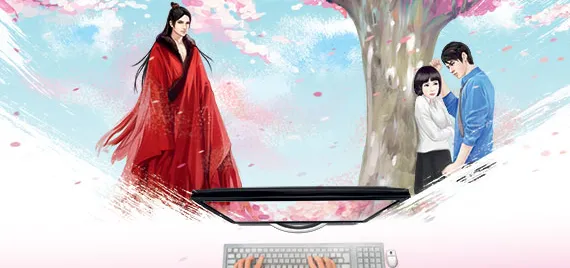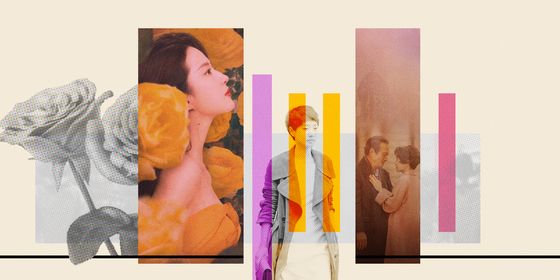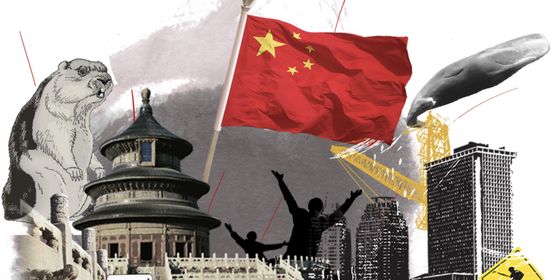The murky realm of plagiarism, formulaic plots, and smut that’s taking the publishing world by storm
Quick question: which Chinese author makes the big bucks?
If you said Nobel Prize Winner Mo Yan, you’d be wrong—he comes in at number 13 in terms of annual income, with a relatively paltry 6.5 million RMB.
But hey, the highbrow stuff doesn’t usually rake in much profit. Perhaps instead you might opt for Hugo Award Winner Liu Cixin.
No again. Sci-fi is far from a cash cow in China.
Instead, turn your attention to the online forums, where a new breed of writer is emerging.
The Chengdu-based West China Metropolis Daily revealed its annual “rich writers list”, which was split between the China Online Writer List and traditional China Writer List. The highest earner of them all belonged to online writer Tangjia Sanshao, the penname of Zhang Wei, who earned 50 million RMB in 2014.
Online writers take in online subscriptions and licensing fees for all related movies and games, significantly boosting their revenue, something few traditional fiction writers can boast. With just royalties, Zhang Jiajia, a novelist and playwright, topped the traditional China Writer List with an annual income of 19.5 million RMB.
But, even writers like Zhang Jiajia have made more than a few bucks via the online method—before becoming a print sensation, he was famous for publishing a series of bedtime stories on Sina Weibo.
Zhang Jiajia and Tangjia Sanshao represent the two most popular online literature styles: fantasy and romance.
CASH FORMULA
If you want to make the big bucks, you need to sell out. Plot, characters, settings—these are but distractions. The key to unlocking the mighty moneymaking power of online literature is the formula.
A, 18, a plain-looking female college freshman from an ordinary family in the bloom of youth, meets B, the most popular guy in college from a well-off family, who eschews the cheerleader type (C), in favor of A and falls madly in love. But, it is an unrequited love, as A has fallen for D, a cool, mysterious head of a multi-national conglomerate.
And, there you have it: online literature. Give them some cute or stupid names, let them do whatever jobs they like, and don’t worry too much about how the plot doesn’t make any sense. Just use your imagination and remember: A cannot be smart or rich—the dumber she is, the easier her life will be.
Popular online fiction in China has become little more than a process of making money out of template fairy tales. Find an adorable way to have your characters meet, a rich male character, sex things up somewhat, and you’re good to go.
If you get writer’s block, you can access a vault of online help in which your readers will guide your story for you. Your story does not belong to you; it belongs to your readers.
Sure, it’s tripe, but online fiction writers now make more money than traditional writers who opt for print. It’s the process of creating the modern Chinese Prince Charming, Cinderella, or Superman and attracting millions of hits every day. Such online works have been adapted into films, TV shows, and games.
FEEL-GOOD STORIES
Literature websites strictly divide readers by gender, one area for men and one for women. The female section is full of romance stories, ancient or modern, set in China. It’s the templates for these that have become startlingly predictable.
The popularity of these stories has given rise to unusual stereotypes. One of the most prevalent is that of male leading characters as successful, handsome businessmen—invariably wealthy and powerful, occasionally a control freak. Sound familiar? This is not entirely dissimilar to the Fifty Shades of Grey train wreck, and many female readers prefer strong male roles in which the female doesn’t have to make many decisions.
The leading female roles are similarly fixed; usually it’s a student or a fresh graduate: inexperienced, young, and naïve. Their most lauded features are being simpleminded and kind.
Strangely those are often the traits of the male leads in online literature directed at male readers: an average boy, not particularly tall or smart, somehow meets a kung fu master or wizard. And, inevitably, the boy goes on to save the world and get the girl, a story as old as time itself. If there is a main character in online literature, it is the concept of luck. Writers get away with any old rubbish as long as they say, “What a coincidence!”
“Readers get tremendous satisfaction reading those stories and the reading process requires no use of brains,” says Wang Xiaomeng, an editor with YueDuJi Publishing, a publisher known for publishing romance novels favored by female readers. Classic feel-good stories are good for business.
It’s Wang’s job to read different online novels, look for good writers, and sign them, publishing their stories in print. In the past 11 months, she has read at least 1,000 novels and “a large percentage of those are feel-good stories.”
Gu Wei, editor of China Wealth and Luxury at The Wall Street Journal, says that the success of someone like Tangjia Sanshao is based on fantasy fulfillment, a practice that has made Tangjia Sanshao very rich indeed.
Many online writers succeed by targeting the lowest common denominator in the feel-good virtual world. A sense of satisfaction is gained through being loved by a rich CEO or surrounded by a bevy of beauties. But, perhaps the most interesting thing about the online writing process is how the readers can play god. One writer, going by the penname Zixiang, began writing stories on Jinjiang Literature City, one of the biggest online lit forums, two years ago. Building her reader base, she was asked by readers to resurrect the dead.
She tried to argue, telling them it was not how the story should go. “I try to make my stories more like serious literature, but my readers don’t buy it.” Not wanting to lose readers, she pulled a Lazarus on a character she needed to kill.
As perhaps the greatest difference with traditional publishing, online literature is constantly interfered with by readers—on everything from forums to reviews. According to Wang, online stories always have happy endings, and in a love story, it’s always best if the leading characters are virgins before they meet. Break these rules at your peril; readers will complain.
And, as usual, sex sells. Zixiang experienced protests from her readers demanding her first sex scene. Of course, headlines implying sex always get more views.
“50 Shades of Online Lit” is a story from our newest issue, “Family”. To read the whole piece, become a subscriber and receive the full magazine. Alternatively, you can purchase the digital version from the iTunes Store.












